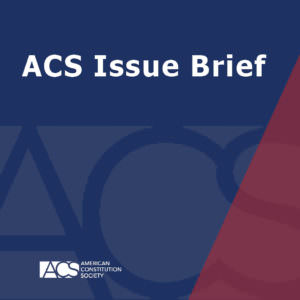The Standardless Second Amendment
Managing Attorney, Vision Legal, Inc.
Professor, UCLA School of Law
October 12, 2010
 ACS is pleased to distribute “The Standardless Second Amendment,” by Tina Mehr, an Attorney Fellow at the Los Angeles County District Attorney’s Office, and Adam Winkler, a Professor of Law at the University of California Los Angeles. In their issue brief, Ms. Mehr and Professor Winkler discuss the state of Second Amendment law following the Supreme Court’s decisions in District of Columbia v. Heller and McDonald v. City of Chicago. The authors observe that “[i]t is often said that there are 20,000 gun control laws in the United States,” and these two decisions, which “held that the Second Amendment guaranteed individuals a right to possess firearms for personal protection,” raise questions about the constitutionality of these laws. Despite the Court’s two recent decisions, Ms. Mehr and Mr. Winkler argue that “Second Amendment doctrine is profoundly unsettled” and that “the Supreme Court failed to give [lower courts] adequate guidance on how to resolve gun control controversies.” The authors discuss how courts have been resolving these disputes and the implications for future cases. They conclude by contending that, “even in the absence of sufficient guidance about how to analyze Second Amendment controversies, the lower courts have consistently read Heller and McDonald to permit lawmakers wide latitude to protect public safety through gun laws.”
ACS is pleased to distribute “The Standardless Second Amendment,” by Tina Mehr, an Attorney Fellow at the Los Angeles County District Attorney’s Office, and Adam Winkler, a Professor of Law at the University of California Los Angeles. In their issue brief, Ms. Mehr and Professor Winkler discuss the state of Second Amendment law following the Supreme Court’s decisions in District of Columbia v. Heller and McDonald v. City of Chicago. The authors observe that “[i]t is often said that there are 20,000 gun control laws in the United States,” and these two decisions, which “held that the Second Amendment guaranteed individuals a right to possess firearms for personal protection,” raise questions about the constitutionality of these laws. Despite the Court’s two recent decisions, Ms. Mehr and Mr. Winkler argue that “Second Amendment doctrine is profoundly unsettled” and that “the Supreme Court failed to give [lower courts] adequate guidance on how to resolve gun control controversies.” The authors discuss how courts have been resolving these disputes and the implications for future cases. They conclude by contending that, “even in the absence of sufficient guidance about how to analyze Second Amendment controversies, the lower courts have consistently read Heller and McDonald to permit lawmakers wide latitude to protect public safety through gun laws.”
 ACS is pleased to distribute “The Standardless Second Amendment,” by Tina Mehr, an Attorney Fellow at the Los Angeles County District Attorney’s Office, and Adam Winkler, a Professor of Law at the University of California Los Angeles. In their issue brief, Ms. Mehr and Professor Winkler discuss the state of Second Amendment law following the Supreme Court’s decisions in District of Columbia v. Heller and McDonald v. City of Chicago. The authors observe that “[i]t is often said that there are 20,000 gun control laws in the United States,” and these two decisions, which “held that the Second Amendment guaranteed individuals a right to possess firearms for personal protection,” raise questions about the constitutionality of these laws. Despite the Court’s two recent decisions, Ms. Mehr and Mr. Winkler argue that “Second Amendment doctrine is profoundly unsettled” and that “the Supreme Court failed to give [lower courts] adequate guidance on how to resolve gun control controversies.” The authors discuss how courts have been resolving these disputes and the implications for future cases. They conclude by contending that, “even in the absence of sufficient guidance about how to analyze Second Amendment controversies, the lower courts have consistently read Heller and McDonald to permit lawmakers wide latitude to protect public safety through gun laws.”
ACS is pleased to distribute “The Standardless Second Amendment,” by Tina Mehr, an Attorney Fellow at the Los Angeles County District Attorney’s Office, and Adam Winkler, a Professor of Law at the University of California Los Angeles. In their issue brief, Ms. Mehr and Professor Winkler discuss the state of Second Amendment law following the Supreme Court’s decisions in District of Columbia v. Heller and McDonald v. City of Chicago. The authors observe that “[i]t is often said that there are 20,000 gun control laws in the United States,” and these two decisions, which “held that the Second Amendment guaranteed individuals a right to possess firearms for personal protection,” raise questions about the constitutionality of these laws. Despite the Court’s two recent decisions, Ms. Mehr and Mr. Winkler argue that “Second Amendment doctrine is profoundly unsettled” and that “the Supreme Court failed to give [lower courts] adequate guidance on how to resolve gun control controversies.” The authors discuss how courts have been resolving these disputes and the implications for future cases. They conclude by contending that, “even in the absence of sufficient guidance about how to analyze Second Amendment controversies, the lower courts have consistently read Heller and McDonald to permit lawmakers wide latitude to protect public safety through gun laws.”
Read the full Issue Brief here: The Standardless Second Amendment
